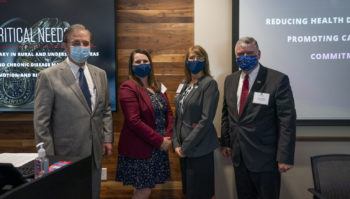Federal Funds Awarded To Nurse-Led Project Combatting Opioid Crisis

A research team led by the Texas A&M University College of Nursing was selected as one of 30 award recipients nationwide to receive federal grant funding through the Rural Communities Opioid Response Program-Neonatal Abstinence Syndrome (RCORP-NAS).
As part of the U.S. Department of Health and Human Services (HHS), through the Health Resources and Services Administration’s (HRSA) Federal Office of Rural Health Policy (FORHP), this $500,000 grant award allows expansion of ongoing efforts to support women, children and families in rural areas impacted by opioid use disorder.
In Texas, 52 percent of child fatalities caused by maltreatment and 68 percent of cases where children were removed from their homes were related to parent or caregiver substance use. The Golden Crescent Children’s Advocates for Recovery Equity (GC-CARE) is an initiative designed to reduce the incidence and impact of neonatal abstinence syndrome (NAS) (the group of conditions caused by withdrawal from certain drugs an infant is exposed to in the womb before birth) in rural communities by improving access to quality care, family support systems and social determinants of health.
Over the course of three years, the nurse-led project team will advance GC-CARE through a multi-faceted approach to encourage prevention, offer quality care, support families in recovery and provide valuable resources to health care professionals combatting substance use disorder (SUD). To do so, the research team will establish strategic partnerships among health systems, community organizations, recovery centers and fellow stakeholders in the Golden Crescent region, an area that includes rural communities in Gonzales, Lavaca, DeWitt, Jackson, Calhoun and Victoria counties.
Increasing access to quality care remains one of the top priorities in advancing health and patient outcomes in rural, underserved areas. GC-CARE will include the initiation of telehealth solutions to provide access to screening, treatment and recovery services, including telebehavioral health, and care coordination to enhance referral and treatment for women at-risk for or with SUD. Online continuing education offerings on proper identification and treatment of SUD in pregnancy, management of childbirth and NAS, and support of parents of newborns in recovery, will also be developed to help ensure providers and stakeholders have access to timely, evidence-based practice to offer specialized care.
Reducing the stigma among those recovering and offering proactive, attainable measures to prevent SUD also play a vital role in GC-CARE. The development of a parent recovery program to provide one-on-one peer support for rural parents in recovery and school-based education, with an emphasis on preventing substance use, are both outlined. With an increased awareness on evidence-based prevention, treatment and management of SUD and NAS, this initiative within the Golden Crescent will help promote healthy babies and mothers, and keep families intact.
“When a mother, father, sister or brother struggles with substance use disorder, the entire family struggles,” said Jane Bolin, associate dean for research at the College of Nursing and lead principal investigator. “This grant focuses on neonatal abstinence syndrome prevention as well as childhood neglect, trauma and abuse. Our goals are to address the needs of children and their families. Under the leadership of Drs. Nancy Downing and Jodie Gary as principal investigators, an amazing team has been pulled together with the capacity to concentrate efforts in building recovery capital to support parents with substance and opioid use disorder and protect vulnerable newborns, children and families.”
Announcement of the nationwide RCORP-NAS grant funding was shared by HRSA Administrator Thomas J. Engels on Sept. 14 at the Texas A&M University Health Science Center.
“We are excited to celebrate these awards during National Recovery Month,” Engels said. “RCORP-NAS will provide needed funding to rural residents grappling with the opioid epidemic to help many people reach recovery.”
Through the RCORP initiative, federal grant funding will help rural communities address barriers to care and the additional strains COVID-19 has placed on both rural individuals with substance use disorder and on rural organizations providing prevention, treatment and recovery services.
The project team includes:
Co-principal investigators
- Jane Bolin, Associate Dean for Research, Texas A&M College of Nursing
- Nancy Downing, Associate Professor, Texas A&M College of Nursing
- Jodie Gary, Assistant Professor, Texas A&M College of Nursing
Co-investigators
- Carly McCord, Director of Telebehavioral Health and Clinical Assistant Professor, Texas A&M College of Medicine
- Dr. Sidney Ontai, Assistant Professor, Texas A&M College of Medicine DeTAR Family Practice Residency Program
- Alison Pittman, Clinical Assistant Professor, Texas A&M College of Nursing
- Sharon Dormire, Assistant Dean for Undergraduate Nursing Education and Professor, Texas A&M College of Nursing
- Robin Page, Assistant Professor, Texas A&M College of Nursing
- Cindy Weston, Associate Dean for Clinical and Outreach Affairs and Associate Professor, Texas A&M College of Nursing
- Joy Alonzo, Clinical Assistant Professor, Texas A&M College of Pharmacy
This article by Kala McCain originally appeared on Vital Record.





